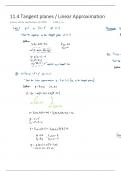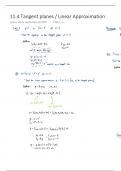Tangent planes - Study guides, Class notes & Summaries
Looking for the best study guides, study notes and summaries about Tangent planes? On this page you'll find 74 study documents about Tangent planes.
Page 4 out of 74 results
Sort by
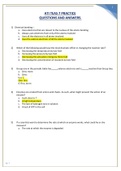
-
ATI TEAS 7 PRACTICE QUESTIONS AND ANSWERS LATEST TEST
- Exam (elaborations) • 48 pages • 2023
-
- $16.49
- + learn more
ATI TEAS 7 PRACTICE QUESTIONS AND ANSWERS. 1) Chemical bonding – a. Uses electrons that are closest to the nucleus of the atoms bonding b. Always uses electrons from only of the atoms involved c. Uses all the electrons in all atoms involved d. Uses the valence electrons of all the atoms involved 2) Which of the following would have the most dramatic effect in changing the reaction rate? a. Decreasing the temperature by two-fold b. Increasing the pressure by two-fold c. Decreasin...
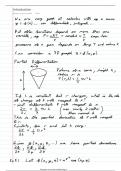
-
Lecture notes: Maths for Engineers and Scientists (Math1551): Functions of Several Variables
- Class notes • 20 pages • 2024
- Available in package deal
-
- $11.07
- + learn more
This set of Year 1 notes from Durham University's "Maths for Engineers" module provides a thorough introduction to Functions of Several Variables. It covers essential topics such as the chain rule, changes of variables, directional derivatives and gradients, tangent planes, normal lines to surfaces, vector fields (Grad, Div, and Curl), and critical points with extreme values. The notes are well-organised and filled with clear examples and detailed explanations, making complex topics mor...
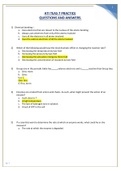
-
ATI TEAS 7 PRACTICE QUESTIONS AND ANSWERS LATEST 2023/2024
- Exam (elaborations) • 48 pages • 2023
-
- $16.69
- + learn more
ATI TEAS 7 PRACTICE QUESTIONS AND ANSWERS. 1) Chemical bonding – a. Uses electrons that are closest to the nucleus of the atoms bonding b. Always uses electrons from only of the atoms involved c. Uses all the electrons in all atoms involved d. Uses the valence electrons of all the atoms involved 2) Which of the following would have the most dramatic effect in changing the reaction rate? a. Decreasing the temperature by two-fold b. Increasing the pressure by two-fold c. Decreasin...
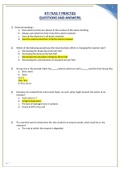
-
ATI TEAS 7 PRACTICE QUESTIONS AND ANSWERS
- Exam (elaborations) • 48 pages • 2023
-
- $16.99
- + learn more
ATI TEAS 7 PRACTICE QUESTIONS AND ANSWERS. 1) Chemical bonding – a. Uses electrons that are closest to the nucleus of the atoms bonding b. Always uses electrons from only of the atoms involved c. Uses all the electrons in all atoms involved d. Uses the valence electrons of all the atoms involved 2) Which of the following would have the most dramatic effect in changing the reaction rate? a. Decreasing the temperature by two-fold b. Increasing the pressure by two-fold c. Decreasin...
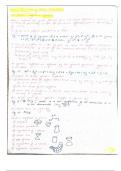
-
MA 261: Midterm #1 Review- 13.6, 14.1-14.2, 14.4-14.5, 15.2, 15.5-15.6
- Class notes • 9 pages • 2024
-
- $14.49
- + learn more
Review of lessons 13.6, 14.1-14.2, 14.4-14.5, 15.2, 15.5-15.6 1.4 for MA 261 (Calculus III) at Purdue University. Content based on class textbook Calculus: Early Transcendentals by Briggs, Cochran, Gillett, Lyle, William, Bernard, Eric, and Schulz (ISBN: 9780134766850). 13.6 covers quadric surfaces and cylinders, including general equations and traces for elliptic paraboloids, hyperboloids of 1 sheet, elliptic cones, cylinders, ellipsoids, hyperboloids of 2 sheets, and hyperbolic paraboloids. ...
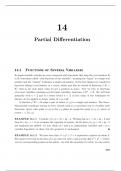
-
Partial derivative
- Other • 36 pages • 2024
-
- $18.99
- + learn more
A book on partial derivatives of 14 would likely delve into advanced mathematical concepts, exploring how partial derivatives apply specifically to functions involving the number 14. It would cover topics such as finding rates of change in multivariable functions where 14 is a constant or variable component. Examples might include calculating gradients, tangent planes, or optimization problems with 14 as a parameter.
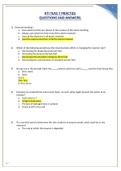
-
ATI TEAS 7 Practice Questions and Answers Chemistry (Best Guide for Teas 7 prep)
- Exam (elaborations) • 48 pages • 2023
-
- $11.49
- + learn more
ATI TEAS 7 PRACTICE QUESTIONS AND ANSWERS. 1) Chemical bonding – a. Uses electrons that are closest to the nucleus of the atoms bonding b. Always uses electrons from only of the atoms involved c. Uses all the electrons in all atoms involved d. Uses the valence electrons of all the atoms involved 2) Which of the following would have the most dramatic effect in changing the reaction rate? a. Decreasing the temperature by two-fold b. Increasing the pressure by two-fold c. Decreasin...
Tangent planes Linear Approximation Notes. and exam questions solved
EVERYTHING YOU NEED ON Tangent planes Linear Approximation
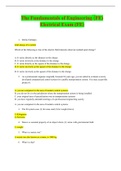
-
The Fundamentals of Engineering (FE) Electrical Exam (FE) Completed. Correct answers Marked
- Exam (elaborations) • 62 pages • 2022
-
- $15.00
- + learn more
The Fundamentals of Engineering (FE) Electrical Exam (FE) Completed. Correct answers Marked The Fundamentals of Engineering (FE) Electrical Exam (FE) 1. Define Enthalpy total energy of a system Which of the following is true of the electric field intensity about an isolated point charge? A. It varies directly as the distance to the charge. B. It varies inversely as the distance to the charge. C. It varies directly as the square of the distance to the charge. D. It varies inversely ...

That summary you just bought made someone very happy. Also get paid weekly? Sell your study resources on Stuvia! Discover all about earning on Stuvia



